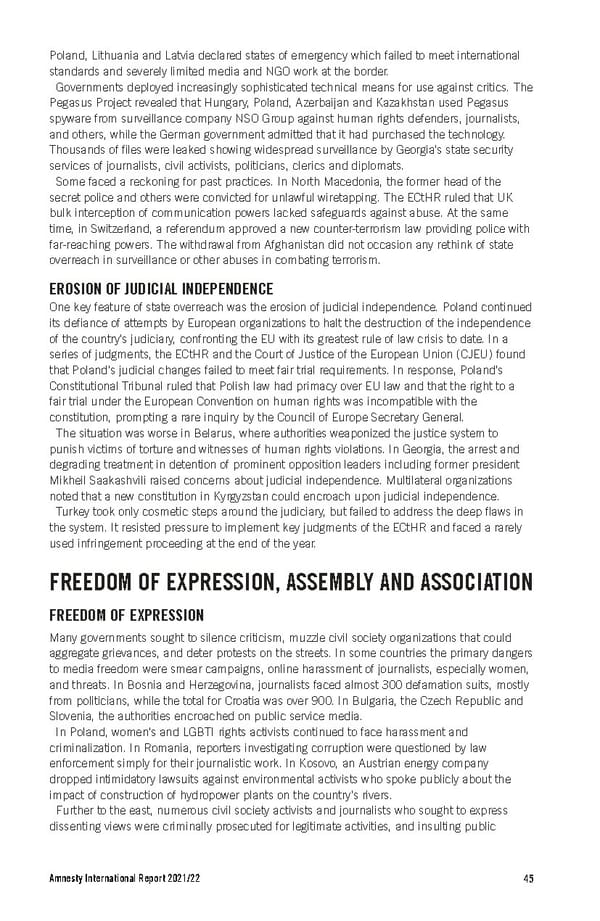Poland, Lithuania and Latvia declared states of emergency which failed to meet international standards and severely limited media and NGO work at the border. Governments deployed increasingly sophisticated technical means for use against critics. The Pegasus Project revealed that Hungary, Poland, Azerbaijan and Kazakhstan used Pegasus spyware from surveillance company NSO Group against human rights defenders, journalists, and others, while the German government admitted that it had purchased the technology. Thousands of files were leaked showing widespread surveillance by Georgia’s state security services of journalists, civil activists, politicians, clerics and diplomats. Some faced a reckoning for past practices. In North Macedonia, the former head of the secret police and others were convicted for unlawful wiretapping. The ECtHR ruled that UK bulk interception of communication powers lacked safeguards against abuse. At the same time, in Switzerland, a referendum approved a new counter-terrorism law providing police with far-reaching powers. The withdrawal from Afghanistan did not occasion any rethink of state overreach in surveillance or other abuses in combating terrorism. EROSION OF JUDICIAL INDEPENDENCE One key feature of state overreach was the erosion of judicial independence. Poland continued its defiance of attempts by European organizations to halt the destruction of the independence of the country’s judiciary, confronting the EU with its greatest rule of law crisis to date. In a series of judgments, the ECtHR and the Court of Justice of the European Union (CJEU) found that Poland’s judicial changes failed to meet fair trial requirements. In response, Poland’s Constitutional Tribunal ruled that Polish law had primacy over EU law and that the right to a fair trial under the European Convention on human rights was incompatible with the constitution, prompting a rare inquiry by the Council of Europe Secretary General. The situation was worse in Belarus, where authorities weaponized the justice system to punish victims of torture and witnesses of human rights violations. In Georgia, the arrest and degrading treatment in detention of prominent opposition leaders including former president Mikheil Saakashvili raised concerns about judicial independence. Multilateral organizations noted that a new constitution in Kyrgyzstan could encroach upon judicial independence. Turkey took only cosmetic steps around the judiciary, but failed to address the deep flaws in the system. It resisted pressure to implement key judgments of the ECtHR and faced a rarely used infringement proceeding at the end of the year. FREEDOM OF EXPRESSION, ASSEMBLY AND ASSOCIATION FREEDOM OF EXPRESSION Many governments sought to silence criticism, muzzle civil society organizations that could aggregate grievances, and deter protests on the streets. In some countries the primary dangers to media freedom were smear campaigns, online harassment of journalists, especially women, and threats. In Bosnia and Herzegovina, journalists faced almost 300 defamation suits, mostly from politicians, while the total for Croatia was over 900. In Bulgaria, the Czech Republic and Slovenia, the authorities encroached on public service media. In Poland, women’s and LGBTI rights activists continued to face harassment and criminalization. In Romania, reporters investigating corruption were questioned by law enforcement simply for their journalistic work. In Kosovo, an Austrian energy company dropped intimidatory lawsuits against environmental activists who spoke publicly about the impact of construction of hydropower plants on the country’s rivers. Further to the east, numerous civil society activists and journalists who sought to express dissenting views were criminally prosecuted for legitimate activities, and insulting public Amnesty International Report 2021/22 45
 Amnesty International Report 2021/22 Page 44 Page 46
Amnesty International Report 2021/22 Page 44 Page 46